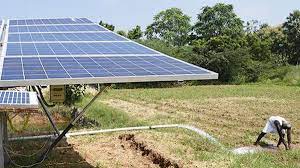Solar Solutions for Indian Agriculture
Solar Solutions for Indian Agriculture: With India’s growing focus on renewable energy, solar power is quickly becoming a valuable tool in agriculture. For farmers, solar energy offers a reliable, affordable, and sustainable way to power essential operations. From solar water pumps to solar-powered irrigation, these technologies are transforming Indian agriculture by reducing energy costs and providing cleaner, more efficient solutions. Let’s explore the top solar solutions for Indian agriculture and why they’re a smart choice for farmers.
Why Solar Power is Great for Agriculture in India
India is one of the world’s sunniest countries, with plenty of sunlight year-round, especially in rural areas where agriculture is common. Solar power can help farmers reduce their dependence on traditional electricity sources and diesel, both of which are expensive and subject to frequent shortages. By switching to solar, farmers can power their operations with clean energy that doesn’t harm the environment, making it an ideal solution for sustainable farming.
1. Solar Water Pumps: A Reliable Solution for Irrigation
One of the most popular solar solutions in Indian agriculture is the solar water pump. These pumps use solar energy to draw water from wells, rivers, or ponds, making irrigation easier, more affordable, and eco-friendly. Solar water pumps are particularly helpful for farmers in areas with unreliable electricity and diesel supplies, providing a dependable solution for keeping crops hydrated.
Benefits of Solar Water Pumps:
- Reduced Costs: Since solar water pumps run on sunlight, farmers save on electricity and diesel costs.
- Eco-Friendly: Solar pumps reduce greenhouse gas emissions and reliance on non-renewable fuels.
- Low Maintenance: With fewer moving parts than diesel pumps, solar pumps need less maintenance and last longer.
- Works in Remote Areas: Solar water pumps are perfect for rural areas without stable grid power.
2. Solar-Powered Drip Irrigation
Solar-powered drip irrigation is a great option for farmers looking to conserve water. This system uses solar energy to power the drip irrigation system, which delivers water directly to the plant roots, minimizing water wastage. Drip irrigation, when powered by solar, is highly efficient and helps farmers manage water usage effectively.
Benefits of Solar Drip Irrigation:
- Water Conservation: Solar-powered drip irrigation reduces water waste by delivering water precisely where it’s needed.
- Energy Savings: The system is powered by solar panels, so there are no energy costs.
- Increased Crop Yield: Proper watering increases plant health and yield, helping farmers maximize profits.
3. Solar-Powered Cold Storage

For many farmers, storing perishable produce is a challenge due to a lack of cold storage facilities. Solar-powered cold storage units offer a sustainable solution by using solar energy to power cooling systems, keeping fruits, vegetables, and other perishables fresh for longer periods. This helps reduce post-harvest losses and allows farmers to sell their products at better prices.
Benefits of Solar Cold Storage:
- Reduces Food Waste: Proper storage reduces spoilage, which is common without refrigeration.
- Increases Income: Farmers can store produce longer and sell when prices are higher.
- Operates in Off-Grid Areas: Solar cold storage is a practical option for rural areas without reliable electricity.
4. Solar Fencing: Protecting Crops and Property
Solar fencing is another useful application of solar energy in agriculture. Solar-powered electric fences provide a secure boundary around farmland to keep animals and intruders out, protecting crops and livestock.
Benefits of Solar Fencing:
- Cost-Effective: Solar fencing requires minimal maintenance and operates on free solar power.
- Reliable Security: Solar fences can operate even in remote locations, keeping farmland safe.
- Eco-Friendly: Solar fencing is more environmentally friendly than traditional electric fences that use grid power.
5. Solar Dryers for Crop Processing
Solar dryers are devices that use solar energy to dry crops like fruits, vegetables, and spices. Traditional drying methods expose crops to dust and pests, reducing quality. Solar dryers keep crops in an enclosed, controlled environment, which maintains quality and speeds up the drying process.
Benefits of Solar Dryers:
- Improved Quality: Solar drying is faster and cleaner than traditional sun drying, improving product quality.
- Cost Savings: Farmers save on fuel and electricity used in conventional drying methods.
- Better Market Value: High-quality dried products can fetch better prices in the market.
Government Support for Solar Agriculture Solutions
To encourage sustainable practices, the Indian government provides various subsidies and incentives for solar energy in agriculture. Through the PM Kusum Yojana, farmers can receive financial support for setting up solar water pumps and other solar-powered systems on their farms. This initiative aims to make solar solutions more affordable and accessible, allowing more farmers to benefit from renewable energy.
How to Get Started with Solar Solutions for Agriculture
- Assess Your Needs: Identify which solar solutions, like water pumps or cold storage, would benefit your farm.
- Check for Government Subsidies: Look into available subsidies or financing options, such as the PM Kusum Yojana.
- Contact a Reliable Solar Provider: Work with a trusted solar provider to discuss costs, installation, and maintenance.
- Calculate Long-Term Savings: Consider the upfront cost versus long-term savings on energy and maintenance to determine the return on investment.
Conclusion
Solar energy offers Indian farmers a cost-effective, sustainable way to power essential farming operations. From solar water pumps to solar-powered cold storage, these solutions help reduce costs, increase crop yield, and provide reliable energy in remote areas. By adopting solar solutions, farmers not only improve their productivity but also contribute to a cleaner, greener future.
As the demand for solar energy continues to grow in Indian agriculture, now is the perfect time for farmers to explore these valuable tools. Solar power is transforming farming across India, making agriculture more efficient, sustainable, and profitable.
Also Read:











